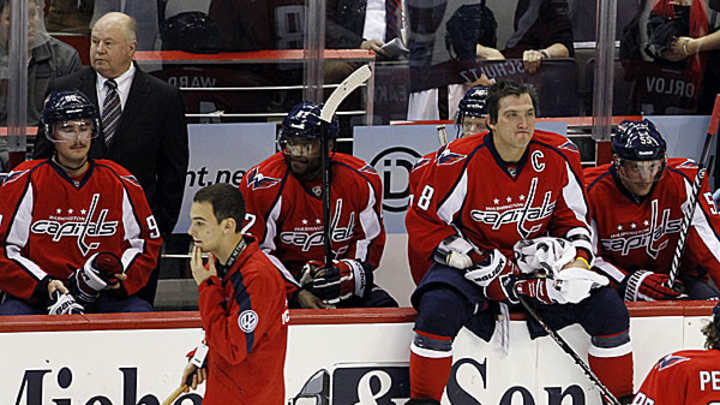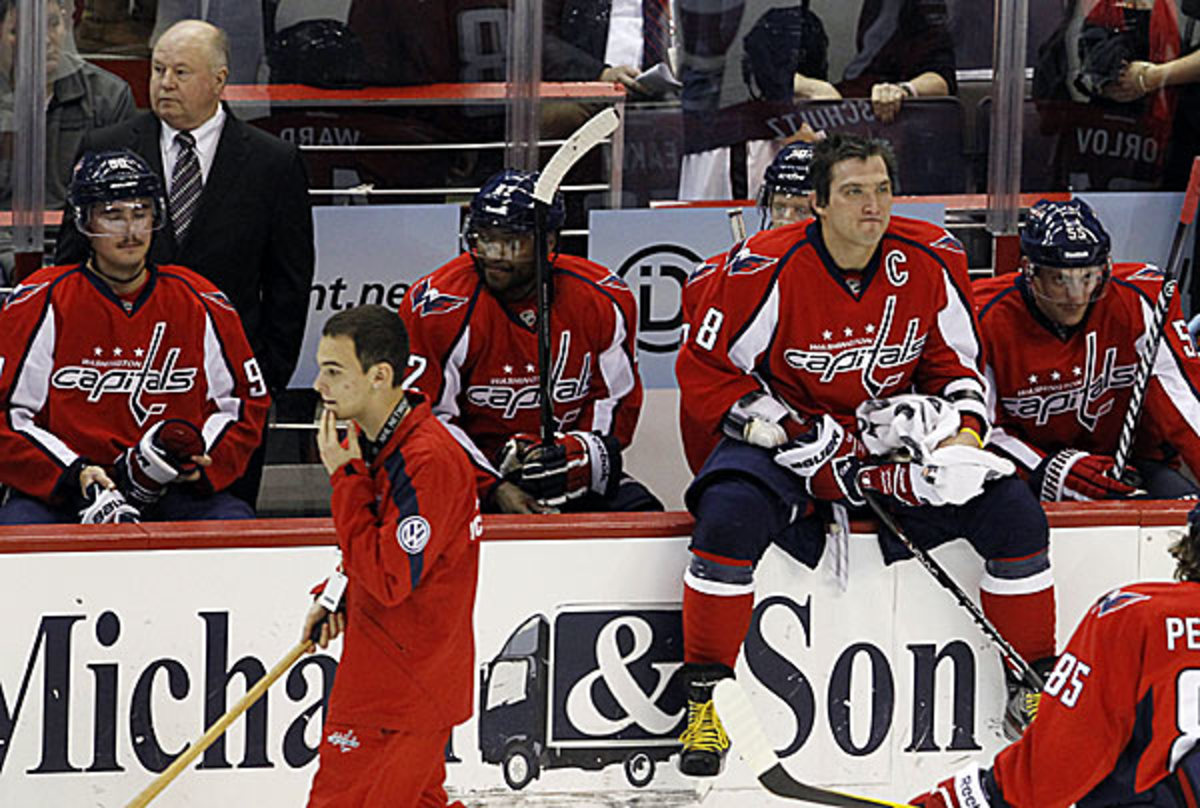Boudreau pays for Caps' inability to adjust

Once a jolly, ebullient players' coach, Bruce Boudreau got tough with his underperforming stars, such as captain Alexander Ovechkin, this season and ended up alienating them. (Ann Heisenfelt/AP Photos)

By Stu Hackel
The coaching obituary of Bruce Boudreau will reflect that one of the NHL's most colorful and visible men behind the bench could not get the best out of a talented group of players when it mattered. When adjustments were on the agenda, he couldn't make his team follow. In a results-oriented business, that's all that counts.
It's too bad, because Boudreau, as we got to see over the past four years, was a terrific personality. Upbeat, unvarnished, to-the-point, sometimes a bit rumpled, an everyman sort of guy. His round belly and equally round smiling visage lacked only a red suit and white beard to make him a profane Santa Claus. He was Santa for Caps fans at the outset of his tenure and he presided over their team's rebirth, perhaps second only to Alex Ovechkin as the face of the club.
When all was going well, the Capitals looked like a fun-loving group, whipping the puck around like no other team, leaping into the boards and each other's arms after every big goal. They were loaded with charisma and Boudreau was their jolly, beloved ringmaster. His ultimate failure -- and, after all, most coaches fail in the end -- shouldn't detract from the enthusiasm and attention he helped bring to hockey in the nation's capital.
Unfortunately, enthusiasm alone can't win Stanley Cups. In fact, enthusiasm plus talent won't do it, either. In today's Rubik's Cube of assembling a championship team, those are only two of a few sides that need to line up.
When Boudreau took over for Glen Hanlon almost exactly four years ago, he encouraged the Caps' offensive instincts, whereas Hanlon, an ex-goalie, was a defense-first guy. Moreover, Boudreau' s effusiveness was an antidote for Hanlon's quiet demeanor. Soon, fans in Washington howled "Bruuuuuce" when he'd show up on the center ice video screen and he regularly appeared in local TV commercials.
And the Caps -- one of the NHL's worst teams prior to the lockout before making some marginal progress under Hanlon -- climbed in the standings with Boudreau at the helm. Some of that coincided with the growth of their young colts, and some was their new coach, who seem poised to be for this group what Glen Sather was for the Oilers of the early 1980's: the laissez-faire overseer who let his horses run. They'd go on to win the Presidents' Trophy and all was right in Washington's hockey world. This club and their coach appeared to be a perfect match.
The difference between Sather and Boudreau was that the Capitals stalled each spring. In 2009, they played a taut series against the Penguins, with five of the games decided by one goal, the sixth by two. The Caps collapsed in Game 7. Following their first place overall finish in 2010, this high-octane team couldn't get past the Canadiens' goaltending and special teams formula and, again in seven games, fell in the first round while being unable to adjust. The Capitals didn't learn the lesson Sather's Oilers learned, that you have to be able to play more than one style of hockey to win in the postseason. In fact, the team that wins the Cup usually can play any style and win.
Boudreau tried to adjust, and hoped to make Washington a more defensive-oriented club. The result was a decline in Ovechkin's and linemate Nicklas Backstrom's production and the team's output as a whole. Yes, they cut their goals-against by 36, but they also scored less, a lot less, 94 goals less. And they won less, dropping 14 points from the season before. More importantly, they fell in the playoffs again, this time to the counter-attacking Lightning, without becoming the hard-to-play-against outfit that Boudreau and GM George McPhee envisioned.
So another round of adjustments preceded this season. McPhee added new, more rugged skaters and, more pointedly, Boudreau adopted a new approach. No longer would he be the buddy-buddy players' coach who pampered his stars. Things started well, then soured. The new Bruce only seemed to alienate Ovie and the Caps further. They lost their collective joie de vivre. There was no try in their game, which was evident in two recent losses against a pair of foes decimated by injury, Toronto and Buffalo.
“You like to think that they’re trying their hardest but at the same time, when we’re not winning a lot of the battles, you’ve gotta believe that there’s more to give,” Boudreau said, quoted by The Washington Posts's Katie Carrera after losing to the Sabres 5-1 on Saturday, in what would be his final game as the Caps' coach. Carrera noted they had allowed five or more goals six times in their last 14 games and been outscored 57-39 in that span. This was a team that had lost its way and Boudreau won't be the one to help them try to find it again. That task falls to Dale Hunter, the former Nordique, Capital and Avalanche forward who was as fierce an NHL player as there was in his era.
Hunter supposedly coaches the way he played, and if the Capitals need a shock to grab their attention again, he should provide it. Like Boudreau, Hunter arrives without any prior NHL coaching experience, although his junior coaching credentials are impressive. He's not known as a coach who favors systems as much as motivation and whether that will work in the NHL today is a question. How his rough demeanor behind the bench will translate at this level and with this particular group of professionals is also a big unknown.
Meanwhile, it's goodbye to Bruce Boudreau, hopefully not for long. He no doubt learned a few things the hard way from coaching the Capitals and will be better for it. There are a few NHL teams flopping around with young, talented players in need of some direction and a new voice that would benefit from his experience. Once again, he might be a perfect fit. But as long as Bruce Boudreau is out of the game, the NHL is a bit less fun.
